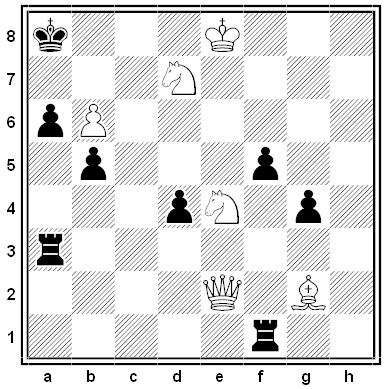Caller ID
In his 1936 collection Brush Up Your Wits, British puzzle maven Hubert Phillips relates that his brother-in-law felt himself cursed with an unintelligent maid. “I have just overheard her taking a ‘phone call,” he told Phillips, “and this is what I heard:
“‘Is Mr. Smith at home?’
“‘I will ask him, sir. What name shall I give him?’
“‘Quoit.’
“‘What’s that, sir?’
“‘Quoit.’
“‘Would you mind spelling it?’
“‘Q for quagga, U for umbrella, O for omnibus, I for idiot –‘
“‘I for what, sir?’
“‘I for idiot, T for telephone. Q, U, O, I, T, Quoit.’
“‘Thank you, sir.'”
Why did he accuse her of unintelligence?
Ice Route
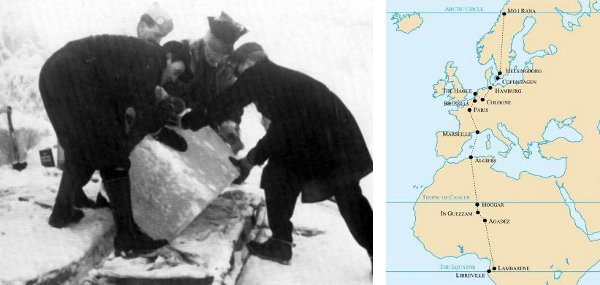
In 1959, in response to a challenge by a radio station, Norwegian insulation manufacturer Glassvatt transported a three-ton block of ice from the Arctic Circle to the equator without refrigeration.
The block, insulated with wood and glass wool, was loaded onto a truck that made its way south through Europe, crossed by freighter from Marseilles to Algiers, and then crossed the Sahara, evading guerrillas and continually bogging down in the sand.
After three weeks the crew arrived in Lambaréné, Gabon, where they delivered 300 kg of medicine to Albert Schweitzer, and they reached their destination, Libreville, a week later. Amazingly, the ice block had lost only 11 percent of its weight. They cut it up, shared it among the citizens of the equatorial city, and flew back to Norway.
In a Word
aspectabund
adj. having an expressive face
metoposcopy
n. the art of judging character by the features
murgeon
n. a grimace
No matter how grouchy you’re feeling,
You’ll find the smile more or less healing.
It grows in a wreath
All around the front teeth,
Thus preserving the face from congealing.
— Anthony Euwer
“The Story of Augustus Who Would Not Have Any Soup”
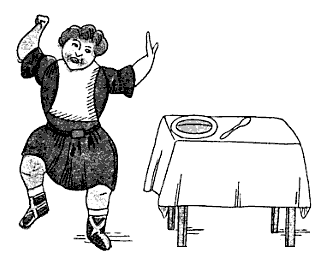
Augustus was a chubby lad;
Fat ruddy checks Augustus had;
And every body saw with joy
The plump and hearty healthy boy.
He ate and drank as he was told,
And never let his soup get cold.
But one day, one cold winter’s day,
He scream’d out — “Take the soup away!
O take the nasty soup away!
I won’t have any soup to-day!”
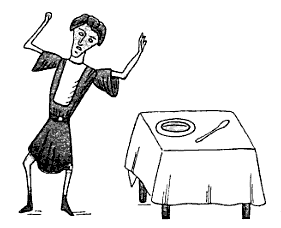
Next day, now look, the picture shows
How lank and lean Augustus grows!
Yet, though he feels so weak and ill,
The naughty fellow cries out still —
“Not any soup for me, I say:
O take the nasty soup away!
I won’t have any soup to-day.”
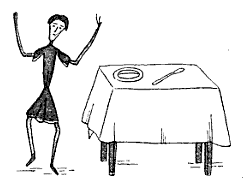
The third day comes; Oh what a sin!
To make himself so pale and thin.
Yet, when the soup is put on table,
He screams, as loud as he is able, —
“Not any soup for me, I say:
O take the nasty soup away!
I won’t have any soup to-day.”
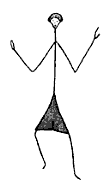
Look at him, now the fourth day’s come!
He scarcely weighs a sugar-plum;
He’s like a little bit of thread,
And on the fifth day, he was — dead!
![]()
— Heinrich Hoffmann, The Struwwelpeter Painting Book, 1900
Apportionment Paradoxes

Until 1911, the U.S. House of Representatives grew along with the country. Accordingly, when the 1880 census showed an increase in population, C.W. Seaton, chief clerk of the census office, worked out apportionments for all House sizes between 275 and 350, in order to see which states would get the new seats.
He was in for a surprise. The method was straightforward: Take the total U.S. population and divide it by the proposed number of seats in the House, rounding all fractions down. This would dispose of most of the seats; any leftover seats would be awarded to the states whose fractional remainders had been highest. But Seaton discovered an oddity:
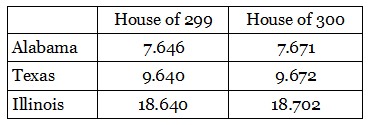
If the House had 299 seats, Alabama would get 8 representatives (because its remainder, .646, was higher than that of Texas or Illinois). But if the House had 300 seats it would get only 7 (the extra representative would now go to Illinois, whose remainder had surpassed Alabama’s). The problem is that the “fair share” of a large state increases more quickly than that of a small state.
Seaton called this the Alabama paradox. A related problem is the population paradox: If the method above had been used in 1901 to reallocate 386 seats in the House, Virginia would have lost a seat to Maine even though the ratio of their populations had increased from 2.67 to 2.68:

Here, even though the size of the House has not changed, a fast-growing state receives fewer representatives than a slow-growing one.
In 1982 mathematicians Michel Balinski and Peyton Young showed that if each party gets one of the two numbers closest to its fair share of seats, then any system of apportionment will run into one of these paradoxes. The solution, it seems clear, is to start cutting legislators into pieces.
(These data are from Hannu Nurmi’s Voting Paradoxes and How to Deal With Them, 1999. Balinski and Young’s book is Fair Representation: Meeting the Ideal of One Man, One Vote.)
Posture Guard
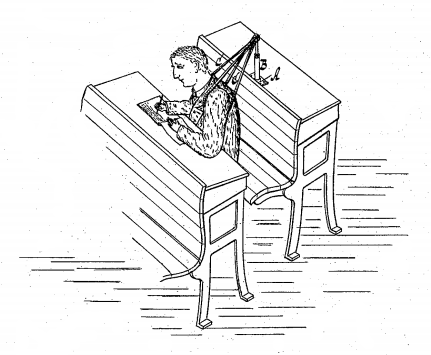
This “scholar’s shoulder brace,” patented by Isidor Keller in 1884, is advertised as “a brace for supporting the shoulders in writing”:
In using my shoulder-brace, I propose to secure the bracket A on a school-desk, as shown in Figs. 1 and 3, then I adjust the standard B to suit the scholar occupying the seat in front of said desk, and finally I pass the loops f f of the shoulder-straps over the shoulders of the scholar, and adjust said loops so as to retain the scholar in a position that will not be injurious to the health or to the eyes.
What if there’s a fire?
Derbes’ Law
Most of our pleasures come from filling or emptying cavities, and vice versa.
Contributed by Dr. Vincent J. Derbes of New Orleans to More of Mould’s Medical Anecdotes, 1989.
Time Series
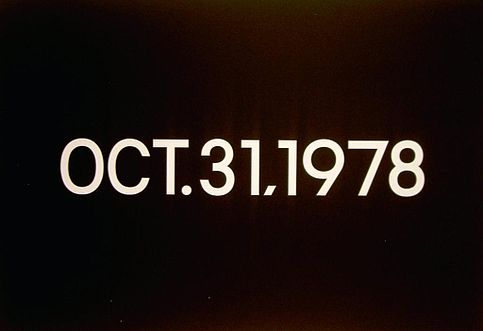
Since 1966, Japanese artist On Kawara has been producing paintings that depict only the date of their creation, executed in liquitex on canvas in eight standard sizes. If he can’t complete a painting on the day he starts it, he destroys it. Each entry in the series is painted carefully by hand in the language of the country in which he produces it; to date he’s completed more than 2,000 paintings in 112 countries, and he says he’ll continue until he dies.
Is this valuable? Yes: In 2006 Christie’s sold Nov. 8, 1989 for £310,000.
Unquote
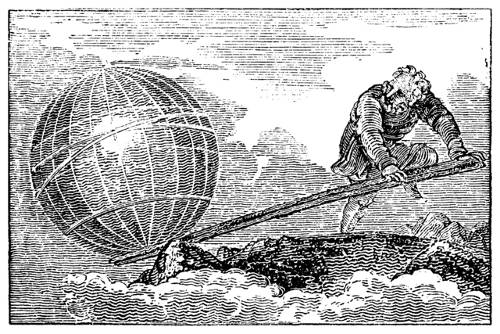
“There is an astonishing imagination, even in the science of mathematics. An inventor must begin with painting correctly in his mind the figure, the machine invented by him, and its properties or effects. We repeat there was far more imagination in the head of Archimedes than in that of Homer.” — Voltaire

